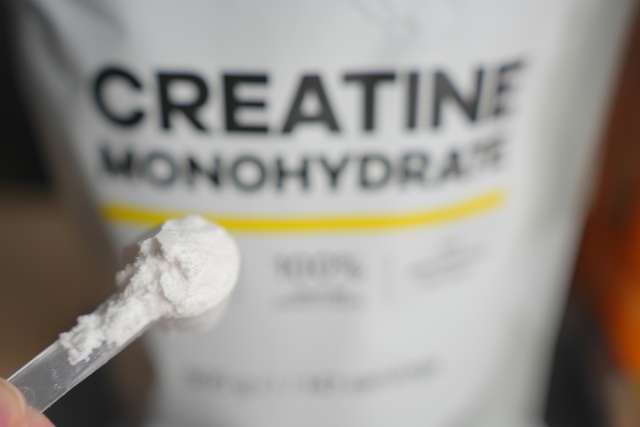Once confined to locker rooms and weight-training circles, creatine has recently become more mainstream. From social media to supermarket shelves, interest in the supplement is expanding beyond athletic performance to areas such as cognitive health, women’s wellness and healthy aging.
To understand what creatine is, what the research says, and who may benefit, we spoke with Yasi Ansari, MS, RDN, CSSD, senior dietitian at UCLA Santa Monica Medical Center.
What is driving creatine’s popularity, and what does the science say?
“Creatine has been well-established in the sports world for decades, but what’s new is the breadth of research. Studies are now exploring potential roles in brain health, mood and aging, in addition to strength and performance,” Ansari says.
She adds that “social media has also made it more visible to people outside the gym.” While the strongest evidence still supports creatine for improving strength, power and muscle mass, Ansari notes that “emerging data suggests it may also help with cognitive function and fatigue, particularly in people experiencing sleep loss, vegetarians and older adults.”
That said, she emphasizes the importance of considering diet first. “Creatine should build on, not replace, a foundation of balanced nutrition that includes adequate protein, carbohydrates and healthy fats,” she says.
How does creatine work in the body?
“Our bodies naturally make creatine from amino acids,” Ansari explains. “We get about 1–2 grams per day from foods such as meat and fish.”
Muscles are typically 60%–80% “full” of creatine at baseline, she says. “Supplementation can raise those stores by 20–40%, which supports short-burst energy for high-intensity movement and may aid recovery between bouts of activity,” Ansari adds.
Who might benefit from taking creatine? And who should avoid it?
Creatine can support several groups:
- Athletes and active individuals: “Especially those engaged in repeated high-intensity, short-duration activity like sprinting, weightlifting, or swimming,” Ansari says. “It can help muscles recover faster for the next burst of effort.”
- Older adults: “For people over 65, creatine can help counter age-related muscle loss, known as sarcopenia, when combined with adequate protein, hydration and strength training two to three times per week,” she says.
- Vegetarians and vegans: “Because creatine is found mainly in animal products, supplementation can help support muscle and cognitive function.”
She cautions that people with kidney disease, or those taking medications that affect kidney function, should speak with their physician before starting creatine supplements.
What are the benefits and drawbacks?
Benefits include well-documented improvements in muscle strength and exercise performance. “We’re also seeing emerging evidence for cognitive and mood support,” Ansari says. “Some studies suggest creatine may help with memory and concentration under stress or sleep deprivation.”
In women, “early research suggests creatine may support muscle and bone health, especially post-menopause when estrogen declines,” she says. However, more research is needed to understand how creatine and strength training together influence these outcomes.
Potential drawbacks are generally mild, she says. Some people experience gas, bloating or stomach upset, particularly at higher doses. “Starting with a lower dose and skipping the ‘loading phase’ – a brief, initial period of taking a high dose of a supplement to douse your muscles as fast as possible – can minimize these effects.”
For some, creatine may cause a temporary increase in body weight from water shifts in muscle tissue.
What are safe dosing and quality guidelines?
“For most adults, 3–5 grams daily is sufficient. Some start with 3 grams and increase gradually,” Ansari says. A short loading phase of 20 grams daily (split into smaller doses) for five to seven days can saturate muscles more quickly, “but it isn’t required,” she notes.
Ansari advises choosing creatine monohydrate, the most studied and effective form, and looking for third-party certifications such as NSF Certified for Sport or Informed Choice to ensure purity and safety. “I recommend avoiding supplements with ‘blends’ on the label,” she says.
What are common myths or misconceptions related to creatine?
“The biggest myths are that creatine is a steroid, that it damages kidneys or that it causes fat gain,” Ansari says. “None of these are supported by current evidence.”
“Creatine is a naturally occurring compound in the body, not a hormone or steroid,” she explains. Studies have found that long-term use of creatine does not harm kidney function in healthy adults. Research also suggests that creatine is safe for short-term use in people with mild kidney issues, though less is known about the effects of taking it for many years in that group.
“People who take creatine may see a small rise in their blood creatinine levels, but that does not necessarily mean their kidneys are being damaged,” she says. “It simply means their doctor may need to look more closely when checking kidney function.”
The takeaway: If your kidneys do not filter waste efficiently or you have any history of kidney problems, it is important to talk with your doctor before taking creatine or any supplement.
If you notice an early change in weight, it is usually temporary and caused by your muscles holding more water, not by fat gain.
Any final advice for those considering creatine supplements?
“Creatine is one of the most researched and reliable supplements available, but it works best as part of a balanced diet that includes adequate amounts of carbohydrates, proteins and fats; adequate hydration; consistent sleep; and a personalized strength-training routine,” Ansari says.
Before starting any supplement, she says, check in with a registered dietitian nutritionist (RD/RDN) or your health care provider to ensure it fits your individual needs and health status.
“Creatine can support performance and long-term wellness, but it’s most effective when used thoughtfully, alongside healthy daily habits,” Ansari says.



